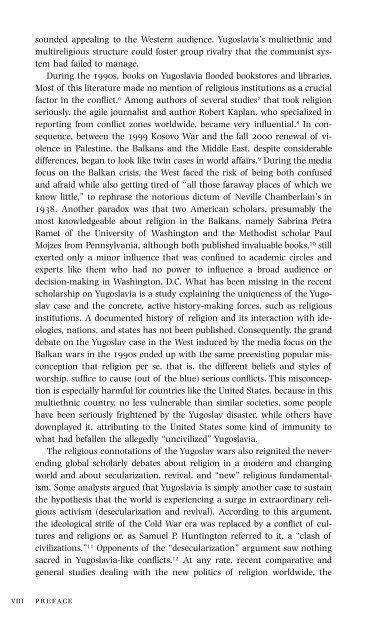Balkan Idols: Religion and Nationalism in Yugoslav States
Balkan Idols: Religion and Nationalism in Yugoslav States
Balkan Idols: Religion and Nationalism in Yugoslav States
You also want an ePaper? Increase the reach of your titles
YUMPU automatically turns print PDFs into web optimized ePapers that Google loves.
sounded appeal<strong>in</strong>g to the Western audience. <strong>Yugoslav</strong>ia’s multiethnic <strong>and</strong><br />
multireligious structure could foster group rivalry that the communist system<br />
had failed to manage.<br />
Dur<strong>in</strong>g the 1990s, books on <strong>Yugoslav</strong>ia flooded bookstores <strong>and</strong> libraries.<br />
Most of this literature made no mention of religious <strong>in</strong>stitutions as a crucial<br />
factor <strong>in</strong> the conflict. 6 Among authors of several studies 7 that took religion<br />
seriously, the agile journalist <strong>and</strong> author Robert Kaplan, who specialized <strong>in</strong><br />
report<strong>in</strong>g from conflict zones worldwide, became very <strong>in</strong>fluential. 8 In consequence,<br />
between the 1999 Kosovo War <strong>and</strong> the fall 2000 renewal of violence<br />
<strong>in</strong> Palest<strong>in</strong>e, the <strong>Balkan</strong>s <strong>and</strong> the Middle East, despite considerable<br />
differences, began to look like tw<strong>in</strong> cases <strong>in</strong> world affairs. 9 Dur<strong>in</strong>g the media<br />
focus on the <strong>Balkan</strong> crisis, the West faced the risk of be<strong>in</strong>g both confused<br />
<strong>and</strong> afraid while also gett<strong>in</strong>g tired of “all those faraway places of which we<br />
know little,” to rephrase the notorious dictum of Neville Chamberla<strong>in</strong>’s <strong>in</strong><br />
1938. Another paradox was that two American scholars, presumably the<br />
most knowledgeable about religion <strong>in</strong> the <strong>Balkan</strong>s, namely Sabr<strong>in</strong>a Petra<br />
Ramet of the University of Wash<strong>in</strong>gton <strong>and</strong> the Methodist scholar Paul<br />
Mojzes from Pennsylvania, although both published <strong>in</strong>valuable books, 10 still<br />
exerted only a m<strong>in</strong>or <strong>in</strong>fluence that was conf<strong>in</strong>ed to academic circles <strong>and</strong><br />
experts like them who had no power to <strong>in</strong>fluence a broad audience or<br />
decision-mak<strong>in</strong>g <strong>in</strong> Wash<strong>in</strong>gton, D.C. What has been miss<strong>in</strong>g <strong>in</strong> the recent<br />
scholarship on <strong>Yugoslav</strong>ia is a study expla<strong>in</strong><strong>in</strong>g the uniqueness of the <strong>Yugoslav</strong><br />
case <strong>and</strong> the concrete, active history-mak<strong>in</strong>g forces, such as religious<br />
<strong>in</strong>stitutions. A documented history of religion <strong>and</strong> its <strong>in</strong>teraction with ideologies,<br />
nations, <strong>and</strong> states has not been published. Consequently, the gr<strong>and</strong><br />
debate on the <strong>Yugoslav</strong> case <strong>in</strong> the West <strong>in</strong>duced by the media focus on the<br />
<strong>Balkan</strong> wars <strong>in</strong> the 1990s ended up with the same preexist<strong>in</strong>g popular misconception<br />
that religion per se, that is, the different beliefs <strong>and</strong> styles of<br />
worship, suffice to cause (out of the blue) serious conflicts. This misconception<br />
is especially harmful for countries like the United <strong>States</strong>, because <strong>in</strong> this<br />
multiethnic country, no less vulnerable than similar societies, some people<br />
have been seriously frightened by the <strong>Yugoslav</strong> disaster, while others have<br />
downplayed it, attribut<strong>in</strong>g to the United <strong>States</strong> some k<strong>in</strong>d of immunity to<br />
what had befallen the allegedly “uncivilized” <strong>Yugoslav</strong>ia.<br />
The religious connotations of the <strong>Yugoslav</strong> wars also reignited the neverend<strong>in</strong>g<br />
global scholarly debates about religion <strong>in</strong> a modern <strong>and</strong> chang<strong>in</strong>g<br />
world <strong>and</strong> about secularization, revival, <strong>and</strong> “new” religious fundamentalism.<br />
Some analysts argued that <strong>Yugoslav</strong>ia is simply another case to susta<strong>in</strong><br />
the hypothesis that the world is experienc<strong>in</strong>g a surge <strong>in</strong> extraord<strong>in</strong>ary religious<br />
activism (desecularization <strong>and</strong> revival). Accord<strong>in</strong>g to this argument,<br />
the ideological strife of the Cold War era was replaced by a conflict of cultures<br />
<strong>and</strong> religions or, as Samuel P. Hunt<strong>in</strong>gton referred to it, a “clash of<br />
civilizations.” 11 Opponents of the “desecularization” argument saw noth<strong>in</strong>g<br />
sacred <strong>in</strong> <strong>Yugoslav</strong>ia-like conflicts. 12 At any rate, recent comparative <strong>and</strong><br />
general studies deal<strong>in</strong>g with the new politics of religion worldwide, the<br />
viii preface


